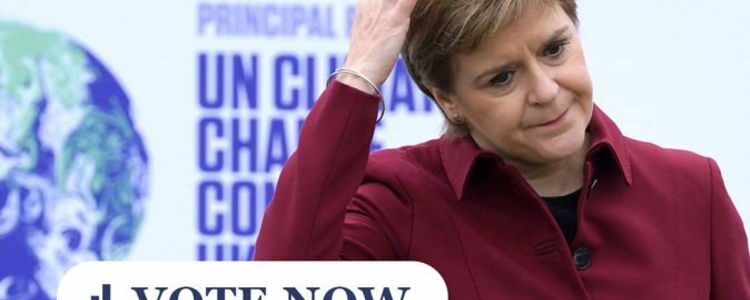
POLL: Is Sturgeon’s bid to make Scotland a Green energy leader without Britain realistic?
Sturgeon ‘extremely concerned’ about rising energy prices
We use your sign-up to provide content in ways you’ve consented to and to improve our understanding of you. This may include adverts from us and 3rd parties based on our understanding. You can unsubscribe at any time. More info
At a virtual conference on the climate emergency earlier this year, the First Minister emphasised Scotland’s responsibility to “lead” on climate policy ahead of the COP26 global leaders’ conference, due to take place on November 1. She said: “Above all, we have a responsibility to lead by example. As one of the nations which led the world into the industrial age, we want this year, to help to lead the world into the net-zero age.”
—————————–
Scotland will aim to achieve net-zero carbon emissions by 2045, five years earlier than Boris Johnson’s pledge for Britain to reach net-zero by 2050.
But critics of Ms Sturgeon say her goal is not realistic.
In an exclusive interview, UK Energy Alliance CEO Mike Foster told Express.co.uk: “There’s always a gap between what Nicola Sturgeon says and what Nicola Sturgeon delivers. I’m reluctant to go down the route to say that she got it right.”
Greta Thunberg gave a scathing review of Ms Sturgeon’s claims of “Green leadership” when questioned by BBC Scotland.
Responding to whether Scotland is a world leader on climate change, Ms Thunberg said: “No… I mean, there are some countries that do a bit more than certain others, but then if we look at it from a broader perspective then I think we can safely say there are no countries – at least in the global North – that are even doing close to what would be needed.”

Scotland has failed to reach its carbon reduction targets for the last three years running, and Ms Sturgeon’s steep targets are becoming more and more out of reach.
Ms Sturgeon’s Climate Change Secretary, Roseanna Cunningham, said: “Scotland has the most ambitious climate legislation in the world.
“Our 2030 target of 75% reduction goes beyond what the Intergovernmental Panel on Climate Change says is needed globally to prevent warming of more than 1.5 degrees.
“It is therefore rightly ambitious and extremely stretching.”
Can’t see the poll below? Click here.
Over and above a new branding of global Green leadership, the First Minister’s political priority remains firmly set on pushing for a Scottish referendum to leave the UK.
When announcing her new ‘programme for government’ on September 7, Ms Sturgeon said that she will offer the Scottish public an independence vote by the end of 2023, but Prime Minister Boris Johnson has given no indication that he would approve such a move.
Her calls have been supported by the Scottish Green party, with whom Ms Sturgeon agreed to share government leadership in late August.
Politicians and journalists have queried whether the alliance is a superficial move to reinforce the image that Scotland is a ‘world leader on climate change’, or whether the new Green partnership is an authentic attempt to stick to net-zero targets.
At the cooperation agreement signing, Ms Sturgeon announced: “Working together to build a greener, fairer, independent Scotland is ground-breaking.
“Ground-breaking in both Scottish, and perhaps even more so, in UK politics.
“Most importantly though, it is an agreement that meets the challenges and the opportunities of our time.”
She added: “We are choosing to work together, and we are doing so not out of political necessity but for the common good.”
Whilst stressing that new Green ministers will collaborate with the SNP on issues such as poverty, Covid recovery, and the establishment of a national care service, Ms Sturgeon emphasised that the agreement reaffirms a “shared commitment to securing independence for Scotland”.
But will the Scottish government be able to deliver on its promises if the public vote for independence?
In 2018/2019, Scotland received about £81 billion in public spending from the UK government, according to Government Expenditure and Revenue in Scotland.
In the same year, tax revenue brought in by Scotland, including North Sea oil revenues, amounted to around £66 billion, meaning the country made a significant loss.
DON’T MISS:
Anton du Beke tipped to beat Len Goodman as best Strictly judge ever
Hypersonic missile showdown: US send signal to Putin
British couple wide-eyed after spotting big cat ‘size of a Great Da…

With more and more funding needed to support Green projects in Scotland, independence appears financially risky to many.
A report by the London School of Economics (LSE), released earlier this year, predicted that Scotland’s economy would shrink by at least £11bn a year if it became independent.
Hanwei Huang, one of the financial report’s authors, said: “This analysis shows that, at least from a trade perspective, independence would leave Scotland considerably poorer than staying in the United Kingdom.”
Stay up to date with Brexit, the SNP and news from Number 10 by signing up for our free politics newsletter here: /newsletter-preference-centre

But Scottish Ministers claim that Green energy resources in Scotland such as wind power will bring in huge revenue for Scotland over time, alongside a decision to re-join the EU once independent.
Fiona Hyslop, the Scottish government’s economy secretary, said: “With our economic resources and advantages, control of economic policy and membership of the EU Scotland would be very well placed to grow the economy.”
Let us know if you believe Scotland will reach net zero by 2045 in the comment section below.
Source: Read Full Article